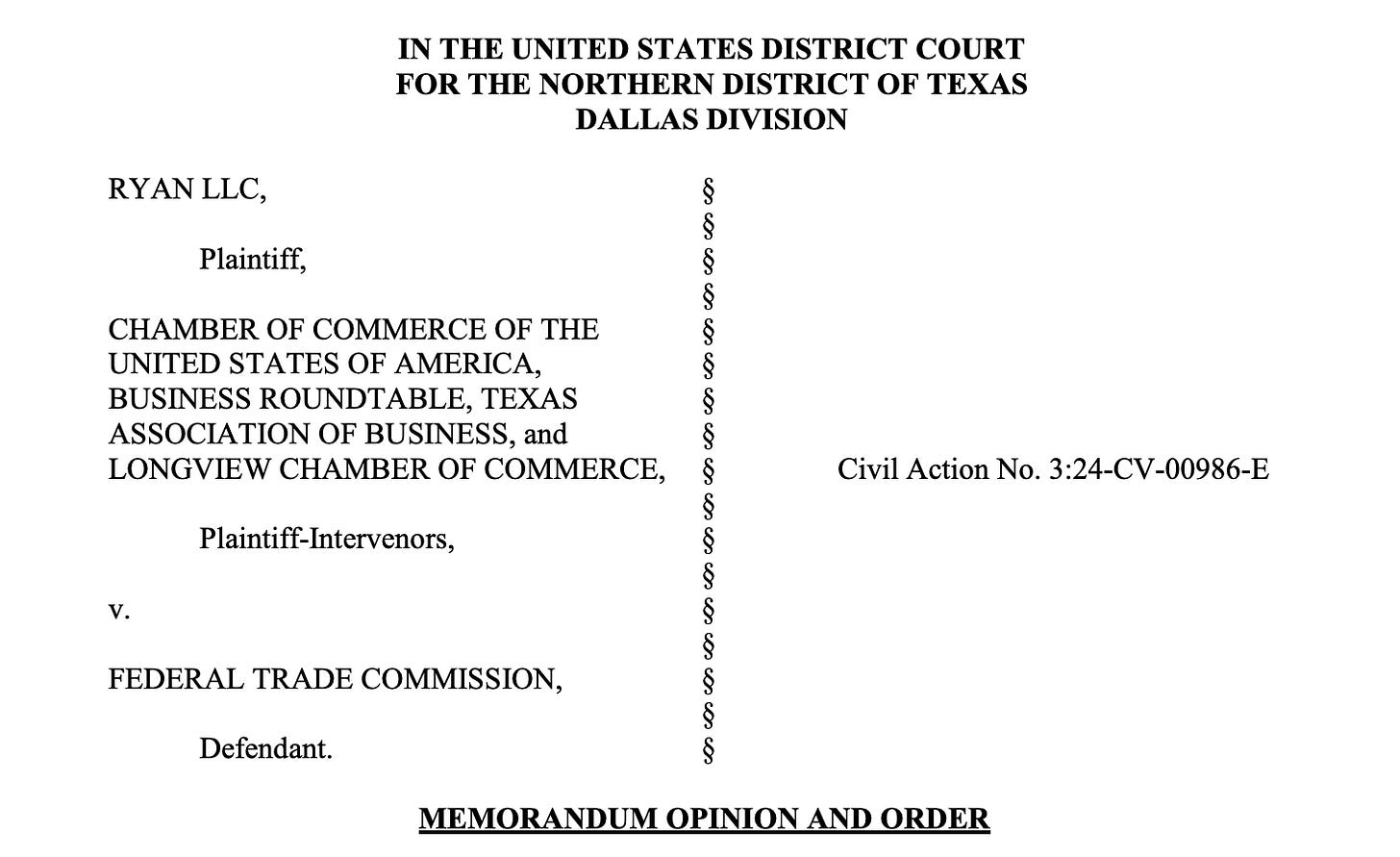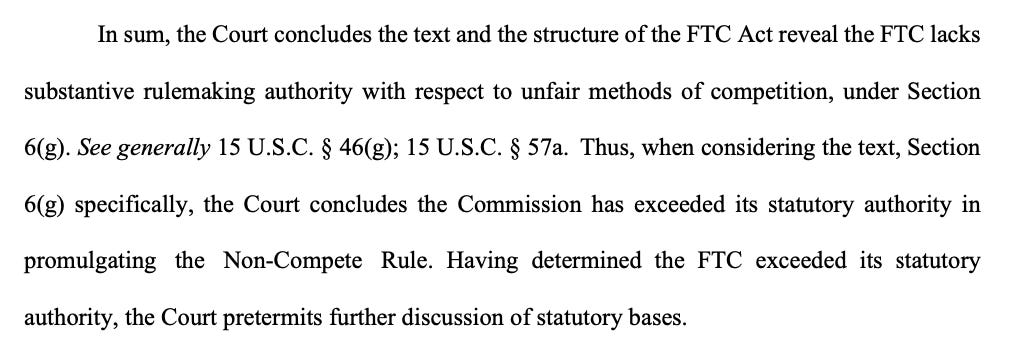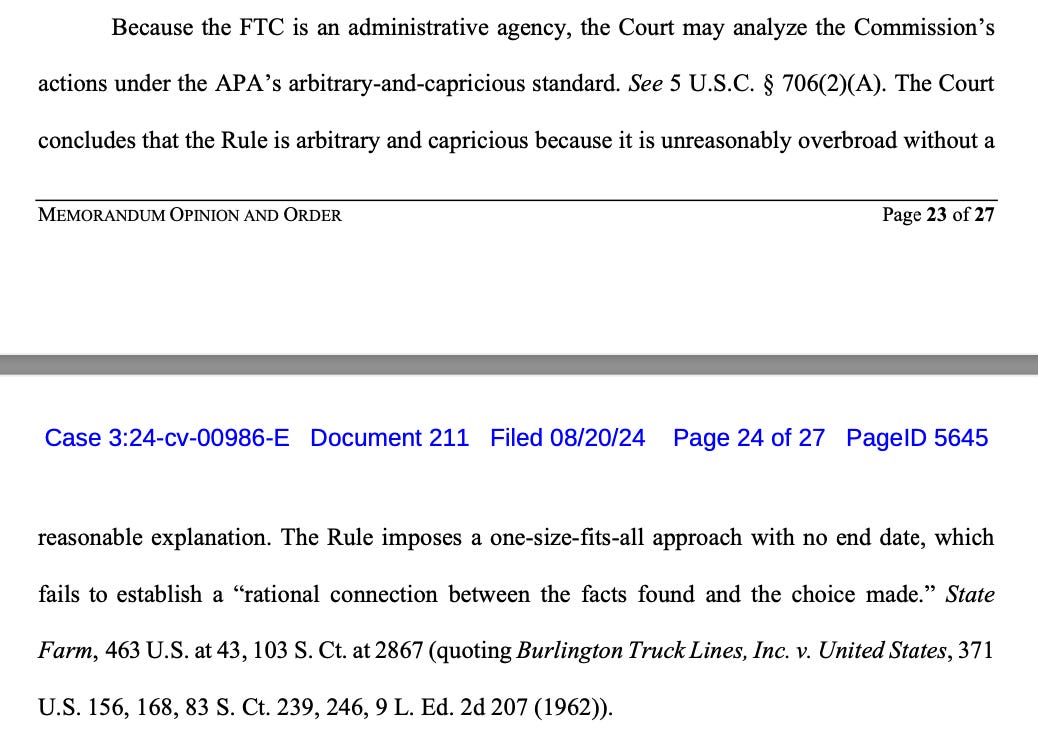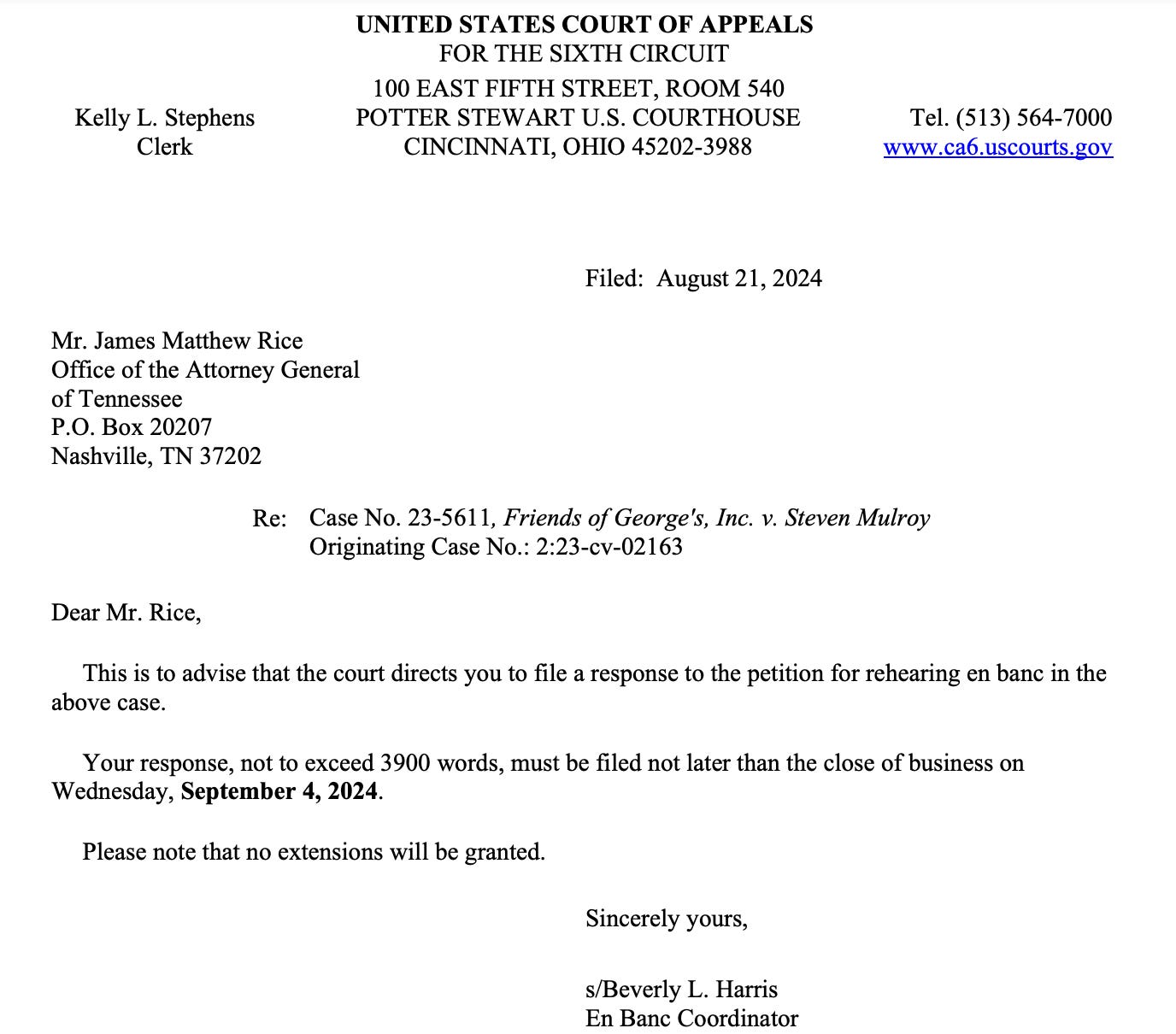Trump appointee blocks Biden admin's rule banning most noncompete restrictions
Another week, another Biden policy blocked by a judge in the Northern District of Texas. Also: Sixth Circuit judges looking at full court review of Tennessee drag decision.
Yet again, a single federal judge in the Northern District of Texas has blocked a Biden administration policy from being implemented nationwide.
On Tuesday, the judge was U.S. District Judge Ada Brown, a Trump appointee, and the policy was the Federal Trade Commission’s rule banning employers’ use of noncompete agreements. The rule was set to go into effect on September 4.
In a relatively brief, 27-page opinion, Brown found that the rule violated the Administrative Procedure Act — a federal law that sets forth how courts review federal rules — because it was both contrary to law and arbitrary and capricious.
[Update, 8:55 p.m.: An FTC spokesperson confirmed on Wednesday evening that an appeal will be forthcoming.]
On the “contrary to law” conclusion, Brown held that the agency was not given substantive rulemaking authority by Congress in the provision of the FTC Act relied upon by the agency for the noncompete rule, earlier referring to it as a “housekeeping” provision.
On the “arbitrary and capricious” determination, Brown pointed to both the breadth of the rule and its lack of end date as reasons to find that it violated the APA.
Previously, in July, Brown had found that the ruling likely violated the APA and, as such, preliminarily enjoined the rule — but only from being enforced against the plaintiffs who had brought suit against the rule.
Tuesday’s ruling contained no such limits. Instead, Brown found that, under the APA, the proper remedy was to fully “set aside” the rule. And that, she found, has nationwide effect under prior decisions of the U.S. Court of Appeals for the Fifth Circuit.
Notably, the FTC, in its briefing in the case, had questioned the propriety of this interpretation of the APA. In a footnote, the agency stated, “The Commission preserves for further review the argument that the APA’s provision for the courts to “set aside” unlawful agency actions, 5 U.S.C. § 706(2), does not authorize the type of universal vacatur that Plaintiffs seek.” In other words, the agency was not arguing that in front of Brown, likely because it expected her to adhere to those prior Fifth Circuit decisions, but it could argue that on appeal or at the U.S. Supreme Court.
Even outside of that, though, the FTC argued that “[t]he APA is not properly read to require vacatur — much less universal vacatur — of challenged action.”
But, that is what Brown did on Tuesday, issuing a final judgment in the case that “sets aside” the rule as to all parties nationwide. “[T]he Rule shall not be enforced or otherwise take effect on September 4, 2024, or thereafter.”
Filed by Ryan, LLC, a tax services firm headquartered in Texas, the U.S. Chamber of Commerce, Business Roundtable, and two Texas business associations quickly intervened in the lawsuit. In addition to Texas counsel, Gibson, Dunn & Crutcher LLP is representing Ryan and Sullivan & Cromwell LLP is representing the Chamber-led intervenors.
The Texas ruling followed another judge having rejected a request for a preliminary injunction in a different challenge to the noncompete rule that had been filed in the Eastern District of Pennsylvania and was brought by ATS Tree Services, LLC, a tree services company. The Pacific Legal Foundation, which represents ATS, did not appeal the July 23 denial from U.S. District Judge Kelley Hodge, a Biden appointee.
A third judge, in the Middle District of Florida, blocked the rule from being enforced against Properties of the Villages, Inc., on August 15. The Florida real estate broker is represented by lawyers from Covington & Burling and Baker & Hostetler LLP. Similar to Brown’s July ruling, the order from U.S. District Judge Timothy Corrigan, a George W. Bush appointee, was a preliminary injunction limited only to the plaintiff company in the case.
The transcript from the hearing in which Corrigan announced his ruling made that repeatedly, abundantly clear: “The injunction only applies to the Properties of the Villages; the Court is not — repeat not — entering a stay of the final rule generally, nor is the Court entering an injunction of nationwide application. It is strictly limited to the party that’s before the Court that brought the suit.”1
Brown’s ruling also came just days after the Supreme Court refused to disturb lower court injunctions blocking a federal sex discrimination rule issued by the Education Department under Title IX of the Education Amendments Act of 1972. There, though, none of the preliminary injunctions before the justices purported to have nationwide effect.
Sixth Circuit drag case update
The U.S. Court of Appeals for the Sixth Circuit is taking a close look at whether the full court should review a three-judge panel’s decision holding the Friends of George’s lacked standing to challenge Tennessee’s anti-drag law.
After the Sixth Circuit issued the 2-1 ruling against standing for the drag group, Friends of George’s asked the full court to review that decision en banc.
In a brief notice filed on Wednesday, the court asked for Tennessee officials to file a response to the request by September 4.
Under the Sixth Circuit’s rules, such a response is only requested when a judge of the court asks for a response or when a judge has asked for a vote on the en banc petition.
As such, it does appear that there is at least some interest in revisiting the panel’s decision.
Law Dork will have more when we know more.
Information about the third ruling on the noncompete rule, out of Florida, was added after initial publication at 1:15 a.m. August 22.







Another case of where an individual circuit court judge takes it on themselves to make a decision for an entire country. I find it frustrating and I keep thinking where the hell do they get the authority?
I'm sure there are various arguments and yadda yadda yadda to be cited, along with precedents most of which I expect would come down to examples of "hard cases make bad law," but in any event we're left with judge shopping on a national scale and courts populated with judges who individually think they are equal to a SCOTUS majority.
Simply put—Texas sucks. But do they actually know how—is the question!!